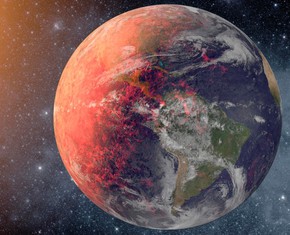The views expressed in our content reflect individual perspectives and do not represent the authoritative views of the Baha'i Faith.
What role can religion play in tackling the major social issues of our time—including the global environmental challenge of climate change?
Some people would say that religion and social or governmental policies should have nothing to do with each other—but religion teaches moral and spiritual truths, so every faithful person has a responsibility to act on those truths. The Baha’i teachings make that principle quite clear:
Happy are they who act; happy are they who understand; happy the man that hath clung unto the truth, detached from all that is in the heavens and all that is on earth. – Baha’u’llah, Epistle to the Son of the Wolf, p. 138.
O well-beloved ones! The tabernacle of unity hath been raised; regard ye not one another as strangers. Ye are the fruits of one tree, and the leaves of one branch. We cherish the hope that the light of justice may shine upon the world and sanctify it from tyranny. – Baha’u’llah, Gleanings from the Writings of Baha’u’llah, p. 218.
After all, religion has played a major role in social change for a very long time. In dealing with issues of war, poverty and human rights, almost every religion has weighed in, prompting believers to follow the teachings of their founders and apply those spiritual principles to current policy concerns.
Christ asked his followers, for example, to pay particular attention to the poor and needy—and Christianity puts special emphasis on doing exactly that, with thousands of churches and their parishioners working hard to alleviate the suffering that poverty and homelessness creates, and to tackle the root causes of poverty, as well.
However—concerns about poverty, war and human freedom have existed for centuries. We know, if we follow just about any Faith, that we have a responsibility not only to other people but to God to do our best to alleviate those concerns. All true religion teaches kindness, caring and compassion for our fellow human beings, so it seems natural and right to respond in any positive way we can to those issues.
But what about the new issues, the ones that have presented themselves to us during the period of our recent history? What about labor strife; cloning; reproductive rights? What about global environmental issues, especially climate change?
Some religious groups have decided to address the issue of climate change by broadly applying the ancient and more general teachings of their Faith—love for others, concern for the well-being of humanity as a whole and stewardship of our natural, God-given environment. On the other hand, some religious groups have vehemently opposed the science surrounding climate change, called it a hoax and pressured their elected representatives in various governments to ignore it.
This drastically polarized, split response, often driven more by political than religious concerns, has divided families and Faiths.
The Baha’i Faith, though, has a built-in mechanism designed to deal constructively and spiritually with these kinds of newly-arising issues. This unique, divinely ordained structure prevents schism and division, upholding the unity the Baha’i teachings call for in every human and religious endeavor, and emphasizing the deep spiritual principles Baha’u’llah brought. Three of those important principles have a direct bearing on the subject of climate change.
First, the Baha’i teachings call for the agreement of science and religion:
Every religion which is not in accordance with established science is superstition. Religion must be reasonable. If it does not square with reason, it is superstition and without foundation. It is like a mirage, which deceives man by leading him to think it is a body of water. – Abdu’l-Baha, The Promulgation of Universal Peace, p. 63.
Second, the Baha’i teachings exalt scientists and commend their important work:
The highest praise is due to men who devote their energies to science, and the noblest center is a center wherein the sciences and arts are taught and studied. Science ever tends to the illumination of the world of humanity. It is the cause of eternal honor to man, and its sovereignty is far greater than the sovereignty of kings. The dominion of kings has an ending; the king himself may be dethroned; but the sovereignty of science is everlasting and without end. –Ibid., p. 348.
Third, the Baha’i Faith has an administrative system that provides continuing, contemporary guidance on emerging issues—a democratically-elected global governing body called the Universal House of Justice. Whatever subjects the original Baha’i writings—from the founder of the Faith, Baha’u’llah; from the Center of its Covenant, Abdu’l-Baha; and from its Guardian, Shoghi Effendi—do not cover, the Universal House of Justice can consult about, legislate on and implement among the world’s Baha’is.
Recently, in November of 2017, the Universal House of Justice, through its Secretariat, wrote a lengthy, detailed letter on the subject of global climate change. In this series of articles, we’ll look at that letter sequentially, point by point, and explore its ramifications, especially where they concern the question of religion’s role in reducing climate change.
Utilizing this guidance from the Universal House of Justice, and applying the Baha’i teachings themselves, we can forge a new approach to the world’s environmental issues.
















Comments
Sign in or create an account
Continue with Googleor